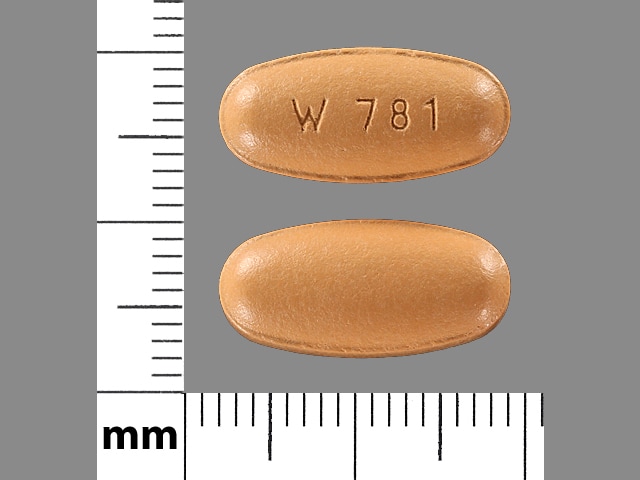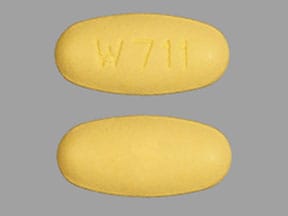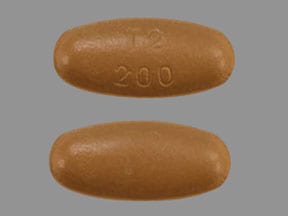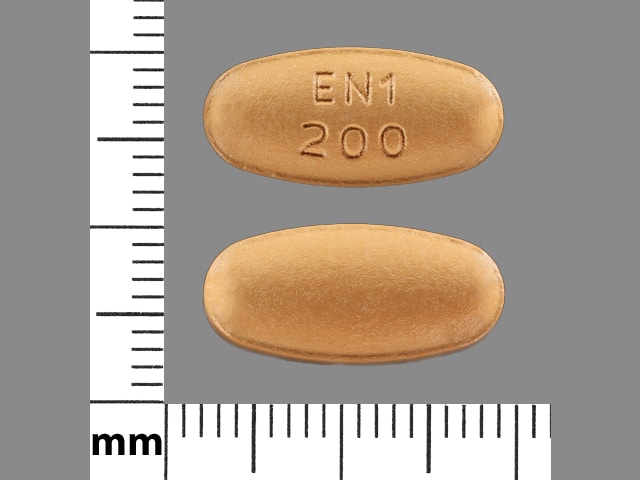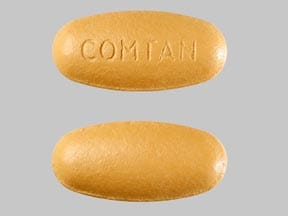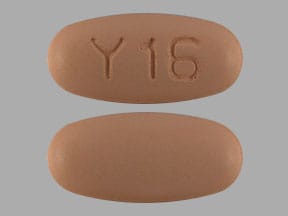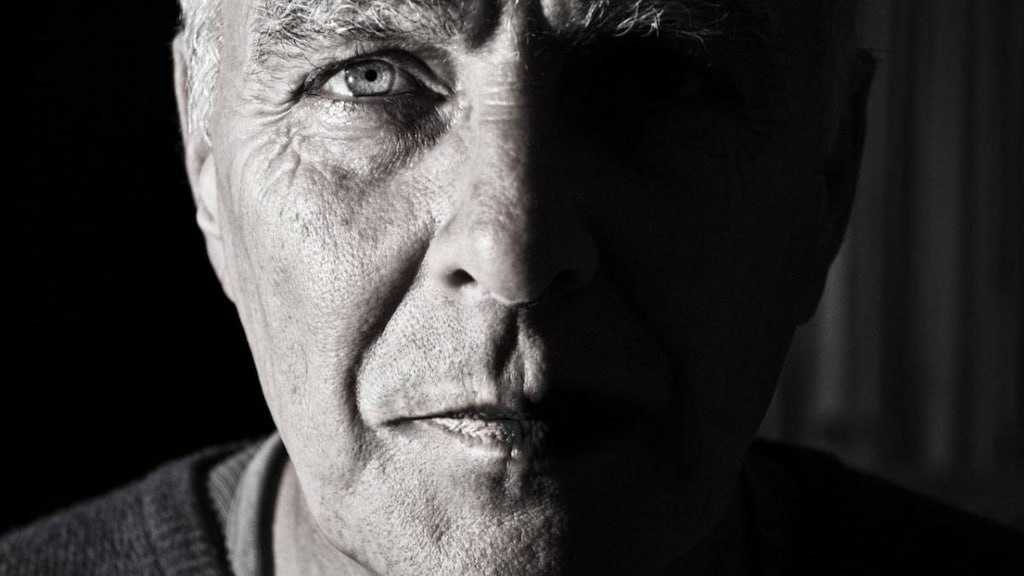What is entacapone used for?
- Entacapone is used to treat Parkinson's disease.
Before taking entacapone, tell your doctor:
- If you are allergic to entacapone; any part of this medicine; or any other drugs, foods, or substances. Tell your doctor about the allergy and what signs you had.
This medicine may interact with other drugs or health problems.
Tell your doctor and pharmacist about all of your drugs (prescription or OTC, natural products, vitamins) and health problems. You must check to make sure that it is safe for you to take entacapone with all of your drugs and health problems. Do not start, stop, or change the dose of any drug without checking with your doctor.
What are some things I need to know or do while I take entacapone?
- Tell all of your health care providers that you take entacapone. This includes your doctors, nurses, pharmacists, and dentists.
- Avoid driving and doing other tasks or actions that call for you to be alert until you see how entacapone affects you.
- To lower the chance of feeling dizzy or passing out, rise slowly if you have been sitting or lying down. Be careful going up and down stairs.
- Talk with your doctor before you drink alcohol or use other drugs and natural products that slow your actions.
- Have blood work checked as you have been told by the doctor. Talk with the doctor.
- This medicine may change the color of urine to brown or orange. This is normal and not harmful.
- The chance of a type of skin cancer called melanoma may be raised in people with Parkinson's disease. It is not known if entacapone may also raise the chance. Have skin exams while you take entacapone. Talk with your doctor.
- Do not stop taking entacapone all of a sudden without calling your doctor. You may have a greater risk of side effects. If you need to stop entacapone, you will want to slowly stop it as ordered by your doctor.
- It is common to have diarrhea with entacapone. Sometimes, diarrhea has been very bad and rarely has led to needing to go to the hospital. Very bad diarrhea may lead to weight loss, dehydration, or low potassium levels. Talk with your doctor.
- If you get diarrhea, you will need to make sure to avoid getting dehydrated. Drink plenty of fluids and watch for weight loss. Talk with your doctor.
- Tell your doctor if you are pregnant or plan on getting pregnant. You will need to talk about the benefits and risks of using entacapone while you are pregnant.
- Tell your doctor if you are breast-feeding. You will need to talk about any risks to your baby.
How is entacapone best taken?
Use entacapone as ordered by your doctor. Read all information given to you. Follow all instructions closely.
- Keep taking entacapone as you have been told by your doctor or other health care provider, even if you feel well.
- Take with or without food.
- Drink lots of noncaffeine liquids unless told to drink less liquid by your doctor.
What do I do if I miss a dose?
- Take a missed dose as soon as you think about it.
- If it is close to the time for your next dose, skip the missed dose and go back to your normal time.
- Do not take 2 doses at the same time or extra doses.
What are the side effects of entacapone that I need to call my doctor about immediately?
WARNING/CAUTION: Even though it may be rare, some people may have very bad and sometimes deadly side effects when taking a drug. Tell your doctor or get medical help right away if you have any of the following signs or symptoms that may be related to a very bad side effect:
- Signs of an allergic reaction, like rash; hives; itching; red, swollen, blistered, or peeling skin with or without fever; wheezing; tightness in the chest or throat; trouble breathing, swallowing, or talking; unusual hoarseness; or swelling of the mouth, face, lips, tongue, or throat.
- Severe diarrhea.
- Diarrhea that will not go away.
- Very bad belly pain.
- Very bad dizziness or passing out.
- Muscle pain or weakness.
- Muscle stiffness.
- Feeling confused.
- Fever.
- Strong urges that are hard to control (such as eating, gambling, sex, or spending money).
- Trouble controlling body movements that is new or worse.
- Shortness of breath.
- Hallucinations (seeing or hearing things that are not there).
- Mood changes.
- Change in the way you act.
- A skin lump or growth.
- Change in color or size of a mole.
- Some people have fallen asleep during activities like driving, eating, or talking. Some people did not feel sleepy and felt alert right before falling asleep. This has happened up to 1 year after entacapone was started. If you fall asleep during activities, do not drive or do other tasks or actions that call for you to be alert while you take entacapone. Call your doctor right away if this happens or you feel very sleepy.
- If you are having diarrhea, call your doctor right away if you have signs of dehydration like dry skin, dry mouth, dry eyes, thirst, fast heartbeat, dizziness, fast breathing, or confusion; signs of low potassium levels like muscle pain or weakness, muscle cramps, or an abnormal heartbeat; or weight loss.
What are some other side effects of entacapone?
All drugs may cause side effects. However, many people have no side effects or only have minor side effects. Call your doctor or get medical help if any of these side effects or any other side effects bother you or do not go away:
- Feeling tired or weak.
- Dizziness.
- Belly pain.
- Constipation.
- Upset stomach or throwing up.
- Diarrhea.
- Dry mouth.
These are not all of the side effects that may occur. If you have questions about side effects, call your doctor. Call your doctor for medical advice about side effects.
You may report side effects to the FDA at 1-800-332-1088. You may also report side effects at https://www.fda.gov/medwatch.
If overdose is suspected:
If you think there has been an overdose, call your poison control center or get medical care right away. Be ready to tell or show what was taken, how much, and when it happened.
Entacapone Images
How do I store and/or throw out entacapone?
- Store at room temperature.
- Store in a dry place. Do not store in a bathroom.
- Keep all drugs in a safe place. Keep all drugs out of the reach of children and pets.
- Throw away unused or expired drugs. Do not flush down a toilet or pour down a drain unless you are told to do so. Check with your pharmacist if you have questions about the best way to throw out drugs. There may be drug take-back programs in your area.
Consumer information use and disclaimer
- If your symptoms or health problems do not get better or if they become worse, call your doctor.
- Do not share your drugs with others and do not take anyone else's drugs.
- Some drugs may have another patient information leaflet. Check with your pharmacist. If you have any questions about entacapone, please talk with your doctor, nurse, pharmacist, or other health care provider.
- If you think there has been an overdose, call your poison control center or get medical care right away. Be ready to tell or show what was taken, how much, and when it happened.
This information should not be used to decide whether or not to take entacapone or any other medicine. Only the healthcare provider has the knowledge and training to decide which medicines are right for a specific patient. This information does not endorse any medicine as safe, effective, or approved for treating any patient or health condition. This is only a brief summary of general information about this medicine. It does NOT include all information about the possible uses, directions, warnings, precautions, interactions, adverse effects, or risks that may apply to entacapone. This information is not specific medical advice and does not replace information you receive from the healthcare provider. You must talk with the healthcare provider for complete information about the risks and benefits of using this medicine.
